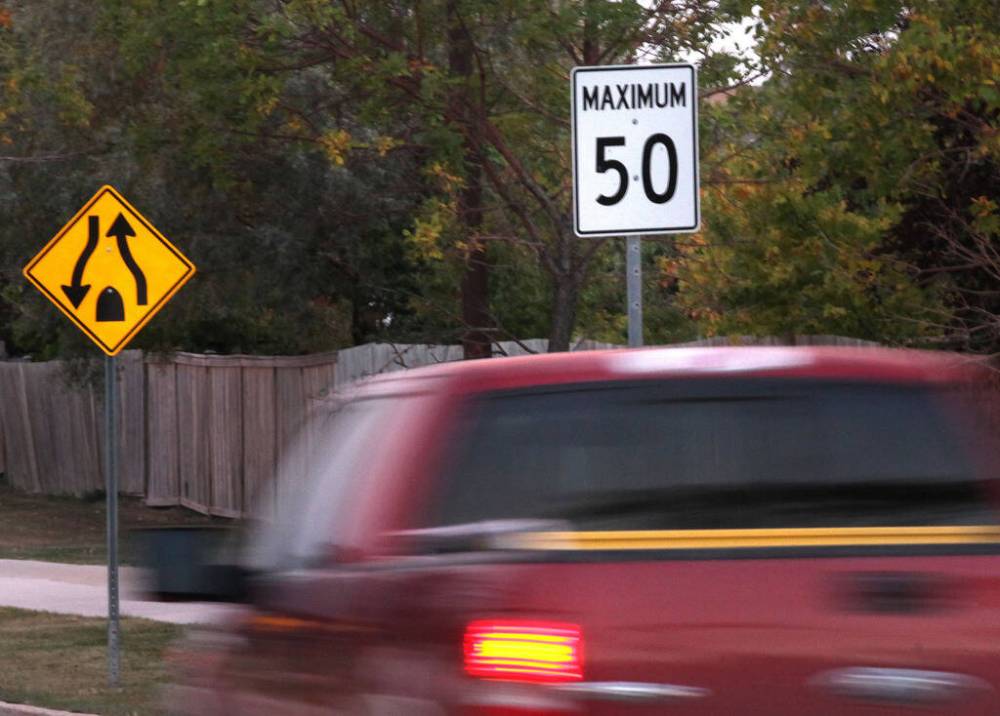Four areas eyed for lower speed limits
Advertisement
Read this article for free:
or
Already have an account? Log in here »
To continue reading, please subscribe:
Monthly Digital Subscription
$0 for the first 4 weeks*
- Enjoy unlimited reading on winnipegfreepress.com
- Read the E-Edition, our digital replica newspaper
- Access News Break, our award-winning app
- Play interactive puzzles
*No charge for 4 weeks then price increases to the regular rate of $19.00 plus GST every four weeks. Offer available to new and qualified returning subscribers only. Cancel any time.
Monthly Digital Subscription
$4.75/week*
- Enjoy unlimited reading on winnipegfreepress.com
- Read the E-Edition, our digital replica newspaper
- Access News Break, our award-winning app
- Play interactive puzzles
*Billed as $19 plus GST every four weeks. Cancel any time.
To continue reading, please subscribe:
Add Free Press access to your Brandon Sun subscription for only an additional
$1 for the first 4 weeks*
*Your next subscription payment will increase by $1.00 and you will be charged $16.99 plus GST for four weeks. After four weeks, your payment will increase to $23.99 plus GST every four weeks.
Read unlimited articles for free today:
or
Already have an account? Log in here »
Hey there, time traveller!
This article was published 31/03/2022 (1355 days ago), so information in it may no longer be current.
Four Winnipeg neighbourhoods have been recommended for a project to assess the effect of reduced speed limits on residential streets.
After an extensive debate, city staff pinpointed places where the standard 50 km/h residential speed limit should be reduced.
Pending approval by the public works committee, the limit would drop to 30 km/h in two neighbourhoods and 40 km/h in two others. A consultant would decide where each exact limit should apply.

The one-year trials are proposed for the Worthington, Richmond West, Tyndall Park South and Bourkevale neighbourhoods, though locations could change depending on feedback from city hall.
An advocacy group that has long lobbied the city to reduce the speed on residential streets welcomed the plan.
“I think that it’s great that they’re doing trial neighbourhoods instead of trial streets. That way, people in the neighbourhoods can try them out, hopefully feel a little more confident letting their kids walk to school or walk to their friends’ houses, or feel more comfortable themselves getting on their bicycles or walking to the store,” said Ian Walker, the chairman of Safe Speeds Winnipeg.
Walker said many folks may at times choose to drive down residential streets because they don’t feel safe walking or cycling. While collisions are typically concentrated on busier roads, the city should aim to prevent the risk entirely, he said.
“I think a lot of people actually don’t use the roads because they’re not safe. Rather than taking the bike or walking to the store, people are taking their cars… There’s not a lot of (residential street) collisions but we should be designing our streets so that there aren’t collisions (at all),” said Walker.
Many Winnipeggers have publicly pushed council to reduce the city’s default 50 km/h speed limit on residential roads, arguing that would lower the risk of fatal crashes and make it safer for pedestrians and cyclists.
However, a petition against lowering the limit to 30 km/h had gathered just under 10,000 signatures by Thursday.
Derek Rolstone is one of the Winnipeggers who opposes the change.
“I have no interest in driving those slow speeds, that’s ridiculous and I can (see) it being a cash grab by the city,” said Rolstone. “There’s some risk in our society but 50 km/h is the right speed for residential (roads).”

He said he isn’t convinced the current speed limit poses a notable safety risk.
While the reduced speed trial has been contemplated for several months, the change isn’t imminent. A request for proposals to support the project should be awarded by May but the date of implementation has yet to be determined, said spokesperson Julie Horbal Dooley, in an emailed statement.
A city report says the neighbourhoods were selected to include two mature communities and two recently constructed ones, with varied layouts and amenities.
The city expects to spend about $400,000 on the pilot project, which council’s public works committee will debate on April 6.
Joyanne.pursaga@freepress.mb.ca
Twitter: @joyanne_pursaga

Born and raised in Winnipeg, Joyanne loves to tell the stories of this city, especially when politics is involved. Joyanne became the city hall reporter for the Winnipeg Free Press in early 2020.
Our newsroom depends on a growing audience of readers to power our journalism. If you are not a paid reader, please consider becoming a subscriber.
Our newsroom depends on its audience of readers to power our journalism. Thank you for your support.
History
Updated on Thursday, March 31, 2022 8:50 PM CDT: adds new photo


